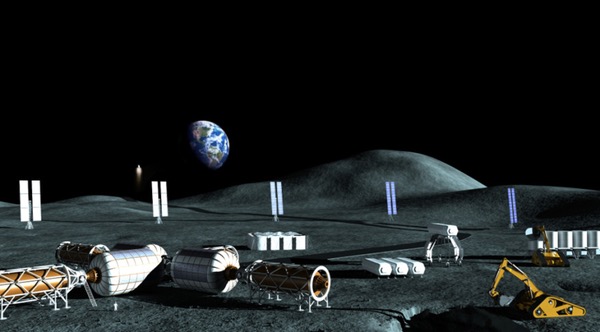G20 agenda: International cooperation in spaceby Vidvuds Beldavs
|
| The message of the inaugural address was “America First.” How a framework for international cooperation to explore and industrially develop the Moon and cislunar space might fit is unclear. |
If the ILD framework would be internationally adopted by 2020, then by 2030 the feasibility of a self-sustaining space economy could be demonstrated. Acceptance of the feasibility of a self-sustaining space economy would drive increasing private investment in space and raise the valuation of firms in the space sector. Feasibility of a self-sustaining space economy would be characterized by an outlook for long term profitability of an increasing range of activities in space marked by declining costs, lower and more defined levels of risks, and the emergence of markets for products made from space resources.
Governments operating within the ILD framework would agree on policies and measures that encourage the emergence of markets for space resources within a defined timeframe. Policies would guide international agreement on the granting of rights to mine space resources as well as policies for the establishment of markets for space resources, and rules to guide the use of infrastructure established in space. Measures would include the financing of strategic infrastructure.
Strategically-directed support would be provided for research and development of enabling technologies and innovation resulting in numerous products required for industrial operations in space as well as people-oriented functions and services ranging from healthcare and housing to space agriculture and space hotels. Innovative approaches to public-private partnerships and guarantees and other incentives would allow even small business to operate with a long-term perspective on space ventures. The space frontier will be opened through international cooperation and public-private partnerships. The ILD is a framework for international action where all states, large and small, can cooperate to develop the promise of space.
But in a year or two, perhaps sooner, the Trump Administration will publicly announce a new space strategy. The message of the inaugural address was “America First.” How a framework for international cooperation to explore and industrially develop the Moon and cislunar space might fit is unclear. Could President Trump announce a US-led effort to achieve breakthrough to a self-sustaining space economy at the upcoming G20 Summit?
The ILD is a framework for international action where all states interested in space development can cooperate. ILD envisions China and the US working together in space along with other countries. While early words from the Trump Administration point to challenges in international cooperation, space involves long term development where long-term mutual interests can be pursued without affecting nearer term concerns.
On July 7–8, the G20 Summit will be held in Hamburg, Germanym hosted by Chancellor Angela Merkel, with US President Donald Trump, Chinese President Xi Jinping, and other G20 leaders. The theme of the German G20 is “Setting the framework for future-oriented, sustainable economic growth.”
| What if the G20 Summit Declaration in July included a statement supporting international cooperation in space? |
The emergence of a sustainable space economy will be marked by an increasing range of space activities financed through profits from business in space rather than from taxpayers on Earth. While space currently represents only about $400 billion of the $75 trillion global economy, space technologies and space infrastructure are necessary for the contributions from the other sectors of the economy. By 2030 the space economy will pas $1 trillion, and by 2050 the space sector could exceed $10 trillion, with much of that based on space resources, including solar power beamed from space. As space resources generate increasing wealth they also generate meaningful, well-paid jobs for people on Earth.
Each G20 Summit results in a Summit Declaration. What if the G20 Summit Declaration in July included a statement supporting international cooperation in space?
We, the Leaders of the G20:
To make the abundance of space resources available to the people of Earth for generations to come, we, the Leaders of the G20, commit to cooperation in space exploration and development to create a self-sustaining space economy that will create jobs on Earth and that can grow without taking resources critical to meet needs on Earth.
We direct that the space agencies of the G20 members work together to develop a strategic plan for international cooperation to create a self-sustaining space economy to be presented for discussion at the next G20 Summit in Argentina in 2018.
